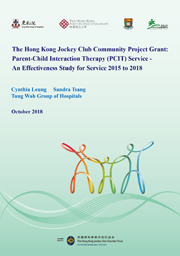
(研究報告下載)PCIT Research - 2018
Year of Research:
October 2018
Title of Research Report:
The Hong Kong Jockey Club Community Project Grant: Parent-Child Interaction Therapy (PCIT) Service - An Effectiveness Study for Service 2015 to 2018
Principal Investigators:
Prof. Cynthia Leung and Dr. Sandra Tsang
Executive Summary:
Introduction:This study mainly examined the effectiveness of Parent-Child Interaction Therapy (PCIT) Service of Tung Wah Group of Hospitals (TWGHs) from April 2015 to March 2018, the effectiveness of PCIT on children aged 8 or above, and the differences between Chinese fathers and mothers in participating in PCIT. Originally, the program targeted parent-child dyads with children aged 2 to 7 with behavior problems. The parents were those who used corporal punishment, were at-risk of child abuse, or experienced high parental stress. In this service project, apart from the usual children target group, we had also included 34 children aged 8 and 9 and used the adapted protocol for older children
Methods: This study was a program effectiveness study involving 538 cases (485 target children and 538 caregivers) served in the project. The mean age of the target children was 5.02 with more boys (70.1%) than girls (29.9%). The majority of these participants (63%) were self-referred. Both quantitative and qualitative data were collected.
Results:The effectiveness study lasted for three years. 382 of the 538 cases in the project completed PCIT treatment successfully. The overall success rate was 71%. Dependent t test was used to analyse the pre-intervention and post-intervention measures of all the 382 successful cases and the three sub-groups among these cases: the established/high risk child abuse subgroup (n = 31), the special educational needs (SEN) subgroup (n = 157), and the target children aged 8 years or above subgroup (n = 27). The results indicated that child behavior problems, parenting stress and the use of corporal punishment were consistently lower at post-intervention in comparison with pre-intervention for all the successful cases in the three sub-groups. There were also significant decreases in inappropriate child management strategies and significant increases in positive parenting practices.
Among the 382 successful cases, 374 participants who were the target child’s biological or adopted fathers or mothers were categorized into 4 groups: mother only, father only, couple-mother, and couple-father for studying the differences between Chinese father and mothers in participating in PCIT. The results indicated that there was no significant difference among the 4 groups in post-intervention scores.
Qualitative results collected from the participants’ focus groups and the therapists’ reflection reports were consistent with the quantitative data. The parents appreciated the immediate direct coaching, the principle of “relationship before discipline”, the systematic evaluation by the therapists, comprehensive service contents and the expertise of therapists. The therapists attributed the success to the direct observation and tailor-made feedback in on-the-spot coaching, intensive and regular interview arrangement, the two-section design of the treatment and the parents’ effort in applying learnt skills at home.
For extending the service to older children, the therapist recognized that PCIT could also benefit this target group with adjustment of the protocol according to the children’s developmental contexts and needs.
Some practice wisdom in engaging fathers to improve their parenting and involving fathers in the program was also collected from the parents. However, both parents and therapists did not find it necessary to make PCIT service differential to cater for the possible different needs of father and mothers.
Results:The effectiveness study lasted for three years. 382 of the 538 cases in the project completed PCIT treatment successfully. The overall success rate was 71%. Dependent t test was used to analyse the pre-intervention and post-intervention measures of all the 382 successful cases and the three sub-groups among these cases: the established/high risk child abuse subgroup (n = 31), the special educational needs (SEN) subgroup (n = 157), and the target children aged 8 years or above subgroup (n = 27). The results indicated that child behavior problems, parenting stress and the use of corporal punishment were consistently lower at post-intervention in comparison with pre-intervention for all the successful cases in the three sub-groups. There were also significant decreases in inappropriate child management strategies and significant increases in positive parenting practices.
Among the 382 successful cases, 374 participants who were the target child’s biological or adopted fathers or mothers were categorized into 4 groups: mother only, father only, couple-mother, and couple-father for studying the differences between Chinese father and mothers in participating in PCIT. The results indicated that there was no significant difference among the 4 groups in post-intervention scores.
Qualitative results collected from the participants’ focus groups and the therapists’ reflection reports were consistent with the quantitative data. The parents appreciated the immediate direct coaching, the principle of “relationship before discipline”, the systematic evaluation by the therapists, comprehensive service contents and the expertise of therapists. The therapists attributed the success to the direct observation and tailor-made feedback in on-the-spot coaching, intensive and regular interview arrangement, the two-section design of the treatment and the parents’ effort in applying learnt skills at home.
For extending the service to older children, the therapist recognized that PCIT could also benefit this target group with adjustment of the protocol according to the children’s developmental contexts and needs.
Some practice wisdom in engaging fathers to improve their parenting and involving fathers in the program was also collected from the parents. However, both parents and therapists did not find it necessary to make PCIT service differential to cater for the possible different needs of father and mothers.


